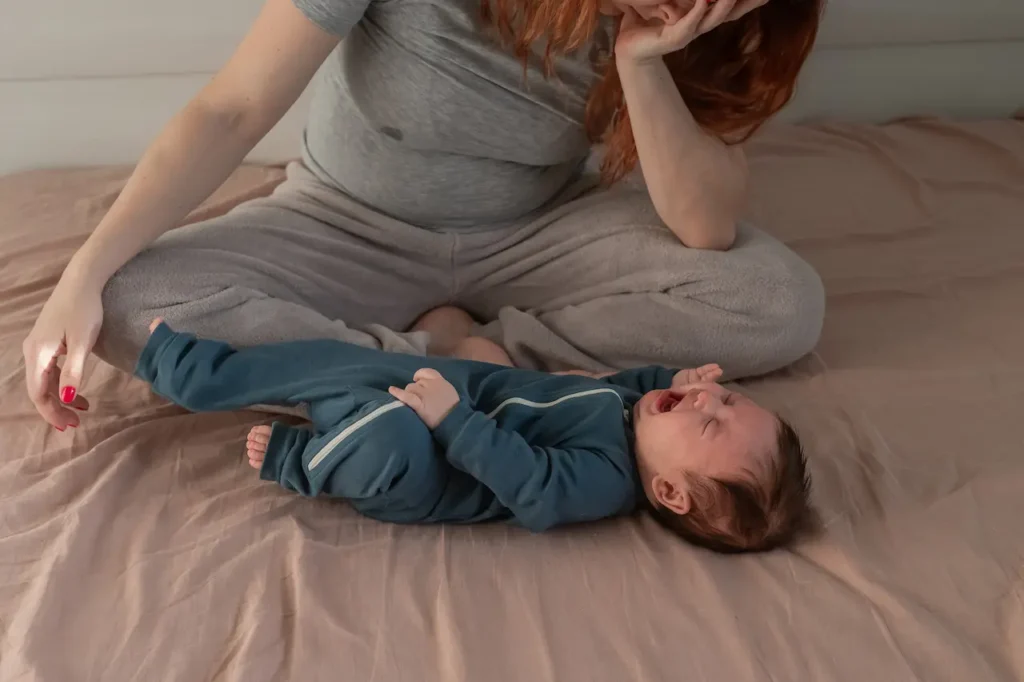The Reality of Motherhood: More Than Just a Caregiver
Motherhood often feels like a rollercoaster of emotions, responsibilities, and adjustments. One mother, reflecting on her own experience, expressed how many women feel: like vessels or caretakers for their newborns. After the birth of her children, she found herself overwhelmed, confused, and thrust into a new world of motherhood with little guidance or support.
While women’s health is given a lot of attention during pregnancy, with doctor’s appointments and prenatal classes, once a baby is born, the focus often turns to the infant,” she writes. In the weeks following birth, the mother is often left to her own devices, expected to rely on her instincts to navigate the challenges of breastfeeding, postpartum recovery, and adjusting to a new lifestyle. This transition is often abrupt, and the support mothers receive is minimal.

The Fragile Emotions of New Motherhood
Postpartum recovery can be an emotional rollercoaster, and many mothers find that their needs are secondary to those of their newborns. One mother noted that after her sons were born, they had multiple check-ups to monitor their health, weight, skin color, and latch were all examined closely. However, she had a different experience.
Her postpartum care was almost non-existent. “I was engorged, bleeding, stitched up. Painkillers and stool softeners were sent home with me. I was expected to figure out colic and night feedings on my own,” she writes. The idea that breastfeeding would “just happen naturally” left her feeling unsupported and alone. This stark contrast between the care given to the baby and the minimal attention given to the mother highlights the systemic failure in postpartum care.
Silent Struggles: Ignored Health and Mental Well-being
The idea that mothers should simply “bounce back” after childbirth is deeply ingrained in many cultures, yet it does a disservice to the physical and mental health of new mothers. For many, the postpartum period is characterized by feelings of isolation, confusion, and frustration.
One mother shared her own experience of being forgotten after childbirth. “Eight weeks after my birth, no one checked on my stitches, my healing, or my mental state. I was given a pat on the back and sent on my way. I felt like I was invisible,” she writes. This is a sentiment shared by many women who feel neglected in the early stages of motherhood, left to deal with their recovery on their own.
A Call for Change in Postpartum Care
The mother’s viral post has sparked a much-needed conversation about the lack of postpartum support. She emphasized that mothers’ health and well-being deserve just as much attention as that of their babies. “We can’t place mothers last. We need to be seen. We need to be heard. We need someone who will not only ask if we are okay but follow up time and time again to make sure we are truly okay,” she wrote.
Her words underscore a call for systemic change, one that prioritizes the mental and physical health of mothers, providing them with the attention and care they deserve, especially in the vulnerable weeks after childbirth.
Mixed Reactions: Shared Experiences and the Need for Support
The post resonated with many women, and the comments section became a space for others to share their experiences with postpartum care or the lack thereof. One woman shared her approach to supporting new mothers: instead of giving baby gifts, she gives gift certificates for self-care, such as pedicures or massages, weeks after the birth. “I tell them I understand that they’re tired, and I want them to know that they’re doing an amazing job,” she explained. Offering time and support for moms, like babysitting, so they can take a break, is one way to help mothers through this challenging time.
Others expressed their motivations to support new mothers more directly. One woman mentioned that her decision to become a doula was driven by her desire to bring attention back to the mothers. “I wanted to show them that they are not invisible and that their needs matter,” she shared. This perspective is a reminder that postpartum care should focus on the whole family, with special attention given to the mother’s recovery and mental well-being.
You might also like: Pregnancy Struggles.
Learning from Other Cultures
Some commenters pointed out that other countries have more developed postpartum care systems. One mother from the Netherlands shared her experience with kraamverzorgenden, a type of postpartum nurse who helps mothers at home for up to two weeks after birth. These professionals assist with baby care, meal preparation, and even help with household chores. This service is often free or covered by insurance. This example highlights the possibility of creating a more supportive and holistic postpartum care system for mothers, ensuring that they are properly cared for in the early days of motherhood.
The question arises: Why isn’t this level of care available in other countries? The answer lies in a lack of systemic prioritization for postpartum health, and the need for governments and healthcare systems to place more focus on the well-being of mothers.
The Two Sides of Postpartum Healthcare
While many mothers feel neglected, there are healthcare professionals who are striving to provide comprehensive care. One new mother shared her disappointment with her 8-week postpartum checkup, where her doctor did not ask about her recovery or mental health. “She gave me a quick exam, asked about birth control, and sent me on my way,” she said. It was later that she realized she was struggling with postpartum depression, a condition that went unnoticed during her checkup.
However, some healthcare professionals argue that they are doing their best within a broken system. One commenter defended nurses, explaining that they regularly check for signs of infection, bleeding, and other potential complications. “They asked if I was okay and made sure I received all the information I needed,” she wrote. Despite their efforts, it’s clear that the healthcare system is stretched thin, and new mothers often fall through the cracks when it comes to comprehensive, empathetic care.
Neglecting Mental Health Can Hurt Its Well-being
Lack of postpartum care may have disastrous consequences on mental health. Postpartum Depression (PPD) is a serious illness that affects the ability of new mothers to care for their babies and themselves. PPD symptoms include sadness, anxiety, fatigue, and feelings that you are inadequate.
According to research, nearly one in seven women suffers from postpartum depressive disorder. However, many of these women are not diagnosed due to inadequate screening or lack of support. Anneliese’s story is a common one among mothers who are feeling invisible and unheard at a time when they most need help.
Early Intervention is Important
It is important to pay close attention during the critical period that follows childbirth. Early intervention can have a major impact on a mother’s ability to recover. Unfortunately, mothers are often unaware of their health due to the lack of follow-up appointments or mental health screenings.
Anneliese’s experience is proof that healthcare providers must prioritize postpartum healthcare. Mental health screenings should be included in regular check-ups to allow healthcare professionals the opportunity to detect and treat any problems before they become more serious.
Don’t Go It Alone
Postpartum care has many facets, and mothers have different opinions and experiences. Some women receive the support they require, while others are left feeling abandoned during one of their most difficult times.
Anneliese’s post opened a vital dialogue about the importance of systemic changes in how postpartum health care is approached. It’s important to remind new mothers who are struggling with feelings like inadequacy or depression that asking for help isn’t a sign of weakness, but a brave step towards healing.
Seeking Support
Consider reaching out to a support group, your general practitioner, or maternal-child health nurse if you are a new mom feeling overwhelmed. It is perfectly normal to feel overwhelmed by new motherhood. You are not the only one experiencing these feelings. Many others have experienced similar emotions.
A strong network of support can also be very valuable. By connecting with other mothers, you can gain a sense camaraderie. There are many resources available in communities, such as mom groups and mental health support. Parenting classes can also help with the transition to motherhood.
Don’t be afraid to take advantage of the available resources. You can find help in many ways, whether it is professional assistance, family and friend support, or community-based programs.
You might also like: Best Thing About Being Pregnant
What is The Role of Family and Partners
Families and friends can also be a great support to new mothers. They must be aware of the difficulties new mothers face, and offer support proactively. It can be anything from helping with household chores, to encouraging the mom to take some time out for herself.
. Communication is essential. Partners should be open and ask the mother how they can assist.
In addition, educating partners on postpartum mental illness can encourage empathy and support. If family members know the signs of anxiety and depression after childbirth, they will be more likely to seek help from their loved ones.
Final Call to Action
The postpartum crisis is an urgent issue that requires attention and action. Anneliese Lawton’s powerful post is a call to action for society to reevaluate the way we support new moms during this vulnerable period.
It is not fair to leave mothers alone on this journey. It is time for families, communities, and healthcare systems to work together to ensure that postpartum care is prioritized, so mothers can be seen, heard and supported.
Let’s strive for a world where all mothers are treated with the respect and care they deserve, not just as caregivers, but as individuals who have their struggles and needs. Together, we can foster an environment that allows all mothers to thrive and, in turn, create healthier communities and families.

Building a Supportive Future
There are several things we can do to improve the postpartum experience. The healthcare providers should be trained in recognizing the unique challenges that new mothers face and prioritizing their health during postpartum appointments. It includes regular mental screenings, information about postpartum conditions and more comprehensive plans of care that address both physical and emotional wellbeing.
Communities can play a part by providing resources and support networks to new mothers. Local organizations, nonprofits, and health departments can develop programs that are focused on maternal mental wellness, providing safe places for mothers to discuss their experiences and ask for help.
Let’s not let new mothers slip through the cracks. It is time to advocate systemic changes, raise awareness of postpartum care and ensure every mother feels valued and supported during one life’s most significant transitions. Prioritizing the health of mothers will lead to stronger families and a more healthy society.




